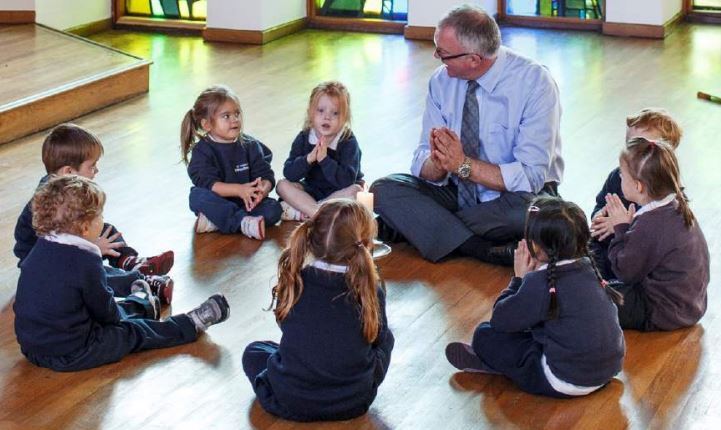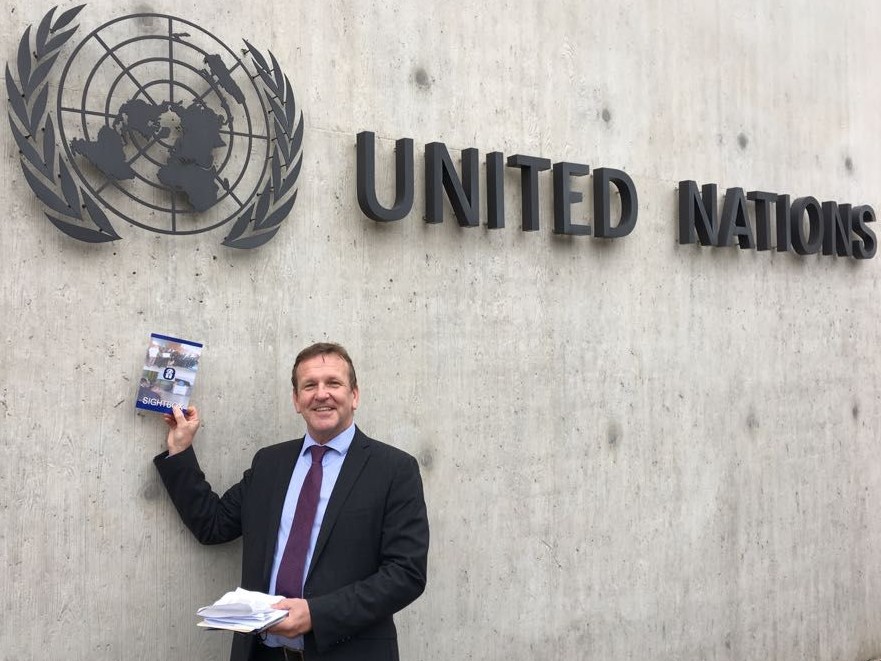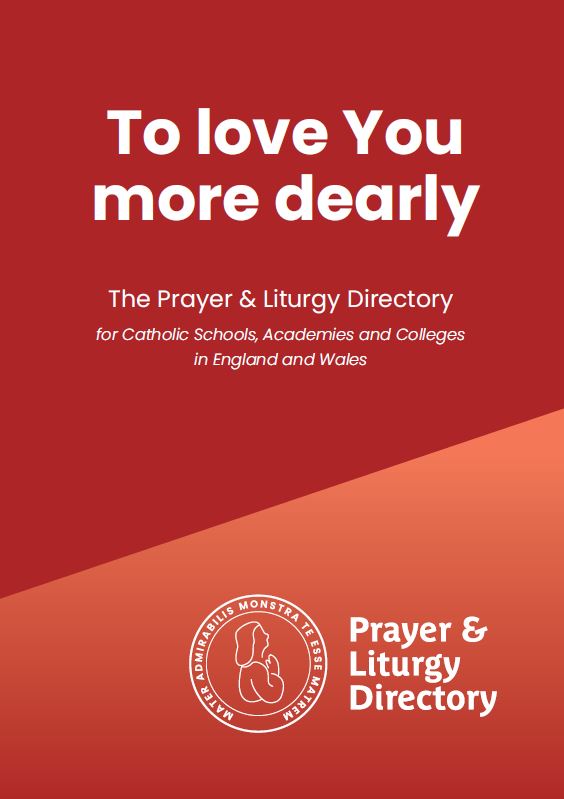Catholic dioceses unlock the potential of school chaplains and youth ministers

Many of the 2,175 Catholic schools, colleges and academies in England employ lay chaplains to address the social, emotional and spiritual needs of students and staff. However, lack of career progression and limited pay can result in low numbers of applicants for school chaplain vacancies, stretched between multiple sites, and who then move on to jobs with better prospects.
Tom Baptist, in collaboration with the Diocese of Nottingham Education Service, has highlighted the issue in establishing a career pathway from apprentice level up to a regional chaplaincy director. Within this a lay chaplain support staff post has been created to avoid teaching assistants taking on pastoral duties beyond their role. It provides formal recognition for their work, improved salary, and potential career progression into chaplaincy.
The lay chaplains are supported by the education structure in Nottingham Diocese, with all 84 of its state-funded Catholic schools within three multi-academy trusts (MATs). Consistent pay and conditions are ensured by the diocesan Human Resources Director who oversees all three MATs.
Also working to solve this problem is Susan Elderfield, Chaplaincy Adviser for the Archdiocese of Southwark, where there are 163 Catholic schools. In 2020 at the beginning of the pandemic she approached St Mary’s University, in Twickenham, to set up a Chaplaincy and Youth Ministry Apprenticeship. This resulted in the Education Skills Funding Agency awarding the university training provider status.
The Level 4 apprenticeship promotes a vocational pathway to develop the knowledge, skills and behaviours of chaplains and youth ministers. It pays particular attention to their formation, which has historically suffered due to an overreliance on informal on-the-job training with some support.
The apprenticeship covers a range of topics, including safeguarding, special education needs and disabilities, bereavement, mental health, behaviour management and the skills to support and lead the spiritual, religious and liturgical life of a school. During the programme each apprentice qualifies as a Youth Mental Health First Aider and achieves a Catholic Certificate in Religious Studies.
Apprentice Alexandra Shelton-Bourke described her experience of studying the course as ‘incredible’, and ‘very practical’. She said: “I continue to learn and develop different skills that I would not have learned otherwise. These skills have been valuable during my placement at school when leading a staff liturgy and delivering acts of worship to students.”
As a result of this apprenticeship, Susan said: “In Southwark, a greater number of schools now have access to a chaplain, and the apprentices feel part of a professional support network. This is important for pupils and for the Catholic life and mission of schools.”
The first 15 apprentices are currently on placements in schools and retreat centres across the dioceses of Southwark, Westminster, Nottingham and Birmingham. They come from a range of backgrounds and ages, some straight from school, others graduates and youth workers, and one a former managing director. Recruitment is currently ongoing for the third cohort which will start in January 2024.
Find out more about the School and College Chaplaincy and Youth Ministry apprenticeship
“We’re not blind — we’ve got VISION”: the extraordinary global success of a Liverpool Catholic school for visually impaired children
 Liverpool is a city famous throughout the world, and a Catholic school is making sure the tradition continues in the field of specialist education.
Liverpool is a city famous throughout the world, and a Catholic school is making sure the tradition continues in the field of specialist education.
Dr John Patterson (pictured, left), Principal at St Vincent’s School, in the Archdiocese of Liverpool, has overseen pupils developing a disability sports toolbox that now helps children in 20 countries across four continents.
He has championed pupils’ leadership skills with an enriched curriculum which has them teaching their international peers in how to use the toolbox, and the Indonesian government has since asked for 70,000 of its social workers to be similarly trained.
The school's pupils have made ceramic Remembrance poppies worn by leaders including then-Prime Minister Theresa May; they have sung for the Queen; and have also been featured in an exhibition by celebrity photographer Rankin for the COP26 climate change summit that took place in Glasgow during 2021.
So how did a lad in oil-stained overalls end up empowering a generation of visually-impaired (VI) young people, both in Britain and beyond?
Innovating education
John Patterson originally started out as an engineer more than 30 years ago, when his mother supported him to retrain as a teacher at Liverpool Hope, one of four Catholic universities in England. Working in inner city primary schools, he soon designed activities linking sports with technology, eventually returning to Liverpool Hope as Head of PE in teacher training and education.
During this time he completed a Master’s degree and PhD and was then asked by the government to set up a free school, at which he was appointed headteacher. In 2012 Dr Patterson became Principal of St Vincent’s School.
“When the Holy Father calls for the reaching of the marginalised we couldn’t really be reaching a more marginalised group than the visually impaired,” he said, adding that the unemployment rate for adults with visual impairments is around 85%, while they have on average five or six fewer friends than sighted people, contributing to isolation, health and wellbeing issues.
As Principal, Dr Patterson set about encouraging students’ entrepreneurialism, employment skills, creativity, and solidarity with those less fortunate. On Wednesdays pupils choose lessons they feel play to their strengths, including in music, drama, sports, ICT, environmental work, and growing food on the school grounds to use in a student-run café.
“Our Lord asked blind Bartimaeus what he wanted, He didn’t presume,” Dr Patterson said, “So for me it’s a big part of following His lead, giving both voice and choice.”
From the Mersey to the world
At the same time he has made use of an extensive network of contacts built up in the city over the years to open up new opportunities for the school.
Pupils have designed computer games and given presentations to major employers including Capita and cereal producer Kellogg’s, which led to VI-accessible information being added to packaging. An essay on the theme of peace, part of citizenship learning, led to a pupil travelling to New York through Liverpool Lions Club to read out his prize-winning entry at the United Nations headquarters.
“It’s a real encouragement to have their voices heard and included, where so often they’re overlooked,” Dr Patterson said.
When pupils learned how little equipment VI children in developing countries have, they resolved to help address the situation. With support from Liverpool Hope and John Moores universities they devised the Sightbox, containers of items to assist blind and VI children participating in sport, such as gym kits, a boccia grid and balls, a goalball, pedometer, digital talking watch, and card games in braille.
Through Liverpool Rotary Club Sightboxes have now been delivered to VI schools worldwide including in Pakistan, Uganda, Ethiopia, Peru, the Virgin Islands, Indonesia and many more including in Nepal (see image below) .

Rotary representatives say the children are much more independent and confident when they have visited a year after first delivering the Sightboxes. The initiative has been recognised by the Royal National Institute of Blind People, and St Vincent’s also sends prescription glasses to children in poorer countries whose eyesight is at risk due to albinism.
The school’s achievements came to the attention of Cardinal Michael Fitzgerald M. Afr. OBE, who was so impressed that he invited the pupils to present their international work at an interfaith forum attended by elders from local mosques and the Lord-Lieutenant of Merseyside, Mark Blundell.
Cardinal Fitzgerald has since invited the Society of Missionaries of Africa, into which he was ordained in 1961, to partner with the school.
As part of celebrations last year to mark the 250th anniversary of Amazing Grace, St Vincent’s pupils sang at St Peter and St Paul, at Olney, near Milton Keynes. This was the parish church of the hymn’s composer, the Revd John Newton, at which the school had been invited to participate in an event organised by the nearby Cowper and Newton Museum.
Leadership
These activities count towards the Duke of Edinburgh’s (DofE) Award, and some of the students have gone on to secure their Gold DofE and play for England VI teams. The school hosts the mandatory VI teacher training programme with John Moores University, while sighted students from elsewhere in the region are taught by St Vincent’s pupils in how to play disability sports, a concept of ‘reverse inclusion’ to promote leadership.
The success of the school has not gone unnoticed, and Dr Patterson won the Silver Lifetime Achievement category at the Pearson National Teaching Awards 2023 and has been granted the Freedom of the City of Liverpool. He has also written a book on VI for Redemptorist Publications, and contributed to a collection of essays celebrating the life-changing impact of Liverpool Hope University, launched at Lambeth Palace Library.
The city’s Regional Combined Authority has affirmed a task force to assist Dr Patterson in delivering international collaborations, emphasising the contribution of Liverpool to the UK economy and drawing research and development funding to the area.
He said: “It’s all part of our school’s enriched curriculum, to enable, empower and signpost pupils into opportunity and employability, and helping other VI pupils globally, it’s what our pupils wanted to do.
“We’re not blind — we’ve got vision.”
St Vincent’s School was established on its present site in 1901 by the Daughters of Charity of St Vincent de Paul. It is part of the Catholic Blind Institute and is consistently rated by Ofsted as outstanding.
New Prayer and Liturgy Directory launched by CES and Bishops' Conference

The directory was presented to dioceses on 17 October by a host of speakers including Dr Sue Price, Director of Pastoral Outreach at the Margaret Beaufort Institute of Theology, and its editors Martin Foster, Director of the Liturgy Office for the Bishops’ Conference; and the Revd Professor Peter McGrail, Subject Lead for Theology, Philosophy and Religious Studies at Liverpool Hope University.
Titled To love You more dearly and published by the Bishops’ Conference and the CES, it is the first such document to support prayer and liturgy coordinators, senior leadership teams and governors and others in implementing the understanding of the Catholic Church in prayer and liturgy.
Communal prayer forms a major part of the spiritual life of the school and to pupils’ moral and spiritual development, with participants invited to recognise God’s action in their lives and that of the school. For example, this can include classroom prayer at the beginning or end of the day, and prayer at the start of a staff meeting.
The Directory has been approved by the Bishops' Conference of England and Wales, and was subject to a number of wide-scale consultations with practitioners which helped to shape and develop the text.
In the preface the Most Revd George Stack, Emeritus Archbishop of Cardiff and Chairman of the Department for Christian Life and Worship, and the Rt Revd Marcus Stock, Bishop of Leeds and Chairman of the Department for Education and Formation, write: “In Catholic schools and colleges across England and Wales, teachers and other adult members of the school community have long supported the life of prayer and liturgy within their schools with imagination and dedication.
“We hope that this directory will affirm what is good practice, while also setting a high bar to which all can aspire.”
Topics covered include the use of music; celebrating sacraments; devotions and more. Sections can also be used to provide focused guidance as follows:
- in developing school policies and systems
- in directly planning prayer and liturgy
- as a focus for evaluating practice
- in staff formation
- as reference points for Catholic school inspectors to support their judgments
Part of a series, the document follows on from To know You more clearly, its Religious Education counterpart published earlier this year.
The title of the new Prayer and Liturgy Directory, To love You more dearly, is taken from a prayer by St Richard of Chichester, a Bishop in the 13th century remembered for his generosity to the poor, mercy shown to sinners, and reform of the liturgical life of his diocese.
Supporting resources for schools, based on the directory, are currently being prepared.
To love You more dearly was drafted and edited by experts including Martin Foster, Director of the Liturgy Office for the Bishops’ Conference; the Revd Professor Peter McGrail, Subject Lead for Theology, Philosophy and Religious Studies at Liverpool Hope University; Philip Robinson, Chief Inspector of the Catholic Schools Inspectorate; Catherine Bryan, Deputy Director of the CES; Dr Nancy Walbank, CES Religious Education Adviser; Elaine Arundell, Primary RE Adviser for the Archdiocese of Westminster, and of the National Board of RE Inspectors and Advisers (NBRIA); Matthew Dell, Senior Lecturer in RE at St Mary’s University, and of Association of Teachers of Catholic Religious Education (ATCRE); Deacon Paul Mannings of the Archdiocese of Liverpool, and of NBRIA; Jane Porter of the Association of Catholic Chaplains in Education (ACCE), and Cardinal Newman School, in Luton; and Peter Ward of NBRIA.
Download and read To love You more dearly or order a hard copy from YPD Books
To love You more dearly: new Prayer and Liturgy Directory now available
The new Prayer and Liturgy Directory for Catholic schools, academies and colleges in England and Wales has been published.
Titled To love You more dearly it is available on the CES website to read or download, while hard copies can also be ordered from YPD Books.

